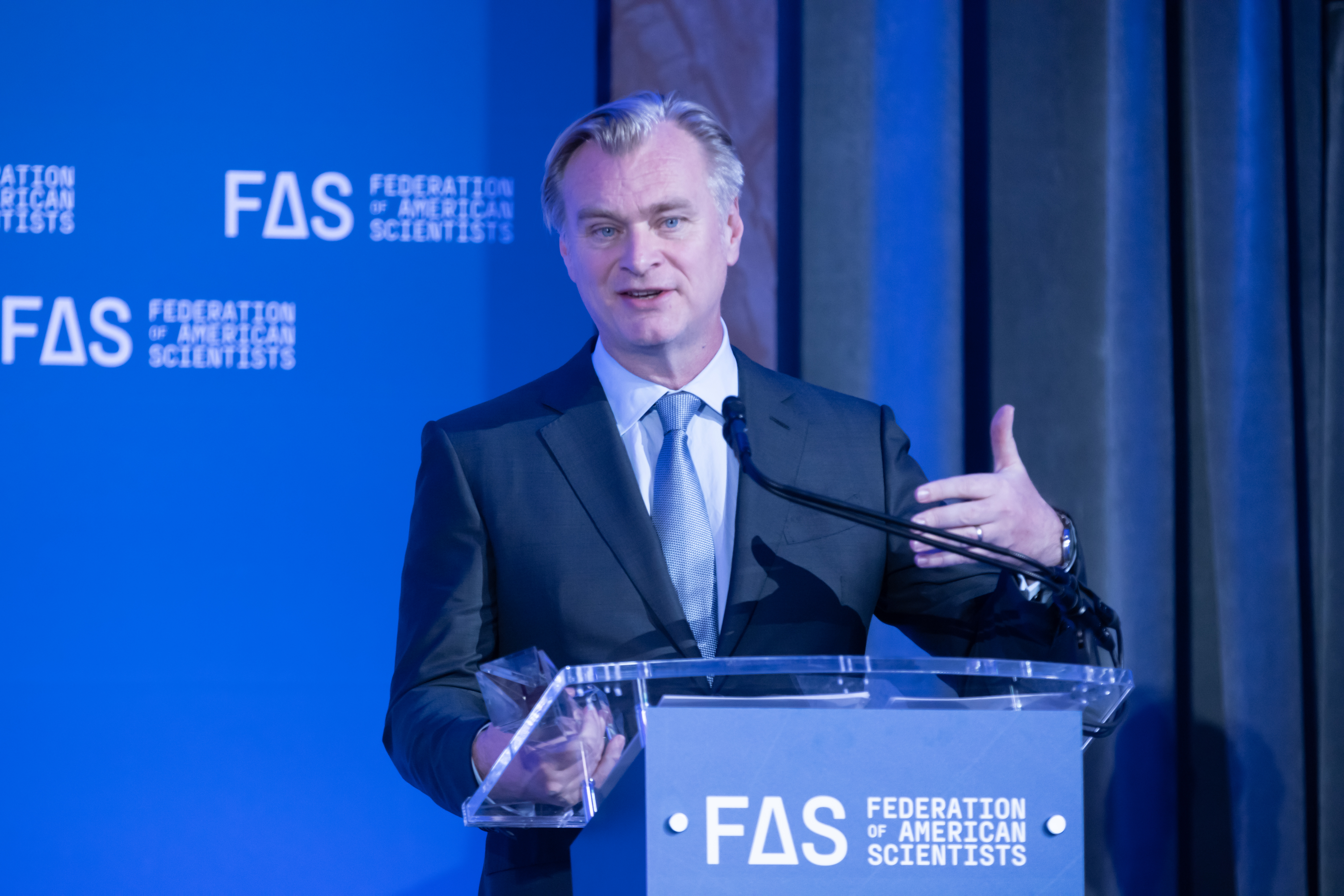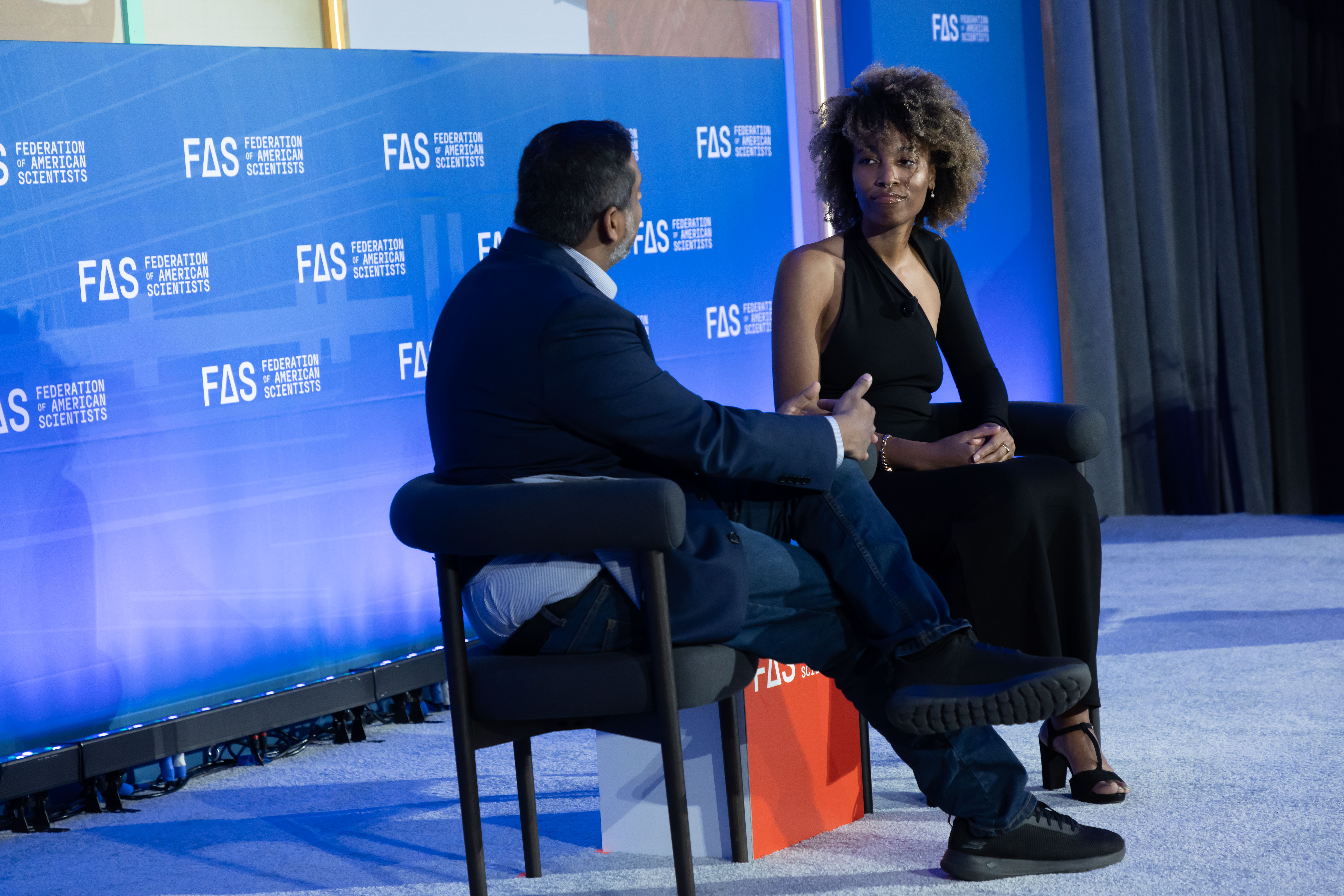The Federation of American Scientists (FAS) Recognizes Exemplary Work in Science Policy and Culture with the 2023 FAS Public Service Awards
Filmmaker Christopher Nolan, Senator Chuck Schumer (D-NY), Senator Todd (R-IN), and Dr. Alondra Nelson presented with FAS Public Service Awards;
Alexa White received the inaugural FAS Policy Entrepreneurship award.
Washington, DC – November 16, 2023 – Technology journalist Kara Swisher presided over the Federation of American Scientists (FAS) ceremony yesterday in Washington, D.C. to award the science think tank’s highest honor: the FAS Public Service Awards. The awards recognize scientists, academics, government leaders, entrepreneurs and others who have elevated science and technology on behalf of the public.
This year’s FAS Public Service Awards honorees were: filmmaker Christopher Nolan for depicting scientist J. Robert Oppenheimer and bringing the global threat of nuclear weapons back into public discussion; Senators Chuck Schumer (D-NY) and Todd Young (R-IN) for their work passing the CHIPS & Science Act, which will greatly expand opportunities for scientists to develop new technologies and compete globally; and Dr. Alondra Nelson, Harold F. Linder Professor, Institute for Advanced Study, for her work at OSTP on artificial intelligence governance and expanding opportunity in the STEM fields. Alexa White received the inaugural FAS Policy Entrepreneur Award. This award recognizes initiative to bring science and technology evidence to government policy.
Nolan’s win for Oppenheimer was the first award bestowed by FAS for cultural contributions through cinema. The story of J. Robert Oppenheimer includes the lives of scientists instrumental in forming FAS in 1945, and artfully conveyed the many complexities of unleashing a new technology that still presents such urgency today.
“Science is truth, and science seeks to disprove itself. It’s proud to say when it’s wrong, because that means something’s been learned and something’s been improved. And in case it hadn’t occurred to you, or in case you’re wondering, there’s nobody else on earth doing that, but scientists, and that’s precious and unique,” says Mr. Nolan.

Director Christopher Nolan speaking at the 2023 FAS Public Service Awards
Leader Schumer and Senator Young spoke about their work collaborating with members of the House to pass the CHIPS and Science Act. Senator Young remained for a fireside chat after the event to discuss emerging global threats; Leader Schumer was called away to address a late night vote.
“It was a pleasure to accept this year’s FAS Public Service Award with Senator Young for our work on the CHIPS & Science Act,” says Leader Schumer. “This transformative legislation—the largest investment in American innovation in a generation—will ensure that the United States stays on the cutting-edge of research, technology development, and manufacturing. I look forward to continuing to work across the aisle to fully fund this act so the U.S can continue to lead the world in innovation, including in critical technologies like AI.”

Senators Schumer and Young showing the crowd their FAS Public Service Awards
Unable to attend in person was Dr. Alondra Nelson, who presented her acceptance by video.
“As a researcher, I was writing about the impact of the White House Office of Science and Technology Policy, when I was asked to serve in it, and then to lead it, to help craft national strategy for US reinvestment in the research and innovation ecosystem, with careful attention to the value proposition these investments should offer the American public, including communities that have not always benefited from such opportunities,” says Dr. Alondra Nelson, Harold F. Linder Professor, Institute for Advanced Study. “It is therefore deeply gratifying to be honored with the Public Service Award because FAS’s commitment to equitable innovation embodies the values we sought to imbue in our work at OSTP on artificial intelligence governance, on expanding opportunity in the STEM fields, and in ensuring American taxpayers’ access to federally funded research.”
Vilas Dhar, president of the Patrick J. McGovern Foundation, presented Ms. White with the FAS Policy Entrepreneur Award. Ms. White developed a policy memo to increase data collection capacity to address environmental injustice and went on to start a consultancy with this focus.
“I brought my passion for environmental justice to FAS as a policy entrepreneur. The AYA Research Institute has grown into a thriving organization in large part due to this memo. I thank FAS for their support of my work so early in my career, and for presenting me with the first ever FAS Policy Entrepreneurship award,” says Alexa White.

Alexa White in conversation with Vilas Dhar at the 2023 FAS Public Service Awards
“Tonight really was the culmination of a few things for FAS – a reinvigoration of our work on global risk at an important moment, and a milestone for FAS’ larger project of championing science, evidence-based policy, and those inside and outside of government who innovate for the greater good,” says Dan Correa, CEO of FAS.
Starting in 1971, the FAS Public Service Awards honors the contributions of a diverse group of scientists, policymakers, and tastemakers in pursuit of advancements in science and technology. Previous winners of the award include: Senators Ted Kennedy, Sam Nunn and Richard Lugar and Secretaries Henry Kissinger, George Schultz and William Perry, and author Carl Sagan, editor Ruth Adams, and activist Sally Lillenthal.
Honorees came from diverse fields across the country including: arts and entertainment, public service, academia, and entrepreneurship. The event was held in the Hamilton Hotel, a downtown landmark opened in 1922.
ABOUT FAS
The Federation of American Scientists (FAS) works to advance progress on a broad suite of contemporary issues where science, technology, and innovation policy can deliver dramatic progress, and seeks to ensure that scientific and technical expertise have a seat at the policymaking table. Established in 1945 by scientists in response to the atomic bomb, FAS continues to work on behalf of a safer, more equitable, and more peaceful world. More information at fas.org.
This rule gives agencies significantly more authority over certain career policy roles. Whether that authority improves accountability or creates new risks depends almost entirely on how agencies interrupt and apply it.
Our environmental system was built for 1970s-era pollution control, but today it needs stable, integrated, multi-level governance that can make tradeoffs, share and use evidence, and deliver infrastructure while demonstrating that improved trust and participation are essential to future progress.
Durable and legitimate climate action requires a government capable of clearly weighting, explaining, and managing cost tradeoffs to the widest away of audiences, which in turn requires strong technocratic competency.
FAS is launching the Center for Regulatory Ingenuity (CRI) to build a new, transpartisan vision of government that works – that has the capacity to achieve ambitious goals while adeptly responding to people’s basic needs.